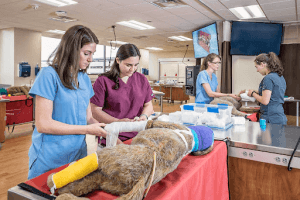
In order to be successful, veterinarians need to possess a wide range of physical and mental skills — from practical skills such as taking blood, through to interpersonal skills such as showing empathy to clients.
1. Animal handling skills
Whether it’s a mouse or a horse, as a vet you’ll need animal handling skills relevant to the type of animals you are treating. While some animals may be perfect patients, others might be nervous, aggressive or downright cheeky, and you will need to know how to handle them in order to deliver effective treatment.
2. Practical skills
Taking blood, placing stitches, listening with a stethoscope, administering medication… the list of practical skills required of veterinarians is certainly long, and one that varies depending on your area of specialisation and the animals you are treating. Excellent fine motor skills and very good eyesight are often important when undertaking certain procedures.
Vets are often required to acquire new practical skills throughout their career, such as practising new anaesthetic techniques, administering nerve blocks, or undertaking specific types of surgery. VetPrac offers a wide range of workshops and courses that allow vets to up-skill, and you can read more about their current offerings here.
3. Analytical skills
Diagnostic procedures such as blood tests are routine in veterinary medicine, and therefore reading and interpreting results is an important part of being a veterinarian. Analytic skills don’t just apply to reading results, but also interpreting those results in conjunction with other tests and the physical examination to arrive at a diagnosis.
4. Scientific aptitude
As a vet, your field of study is veterinary science, and that says it all. Vets need an aptitude for science, not only to get through the required university degree, but also in order to progress in the field. Having an aptitude for science is very import.
This ensures that you’ll understand the basic science behind an animal’s biological make up, through to furthering your knowledge by reading and understanding scientific studies.
5. Interpersonal skills
Being great at treating animals is one thing, but also being great at connecting with their human owners is another. Communication skills are critical, as is an ability to show empathy — and this includes a large scope of communication from delivering a difficult prognosis or dealing with an owner who may need a little education in terms of understanding how to better care for their animal.
6. Organisational skills
Being organised and methodical is an important skill to have as a veterinarian. It not only applies to being able to manage a busy day and stick to appointment times, but also how you approach treatment — for example, when undertaking surgery you will need a clear plan and method to follow, usually within a strict timeframe.
7. Technical skills
In the modern era, vets need to be able to do more than operate a stethoscope and take some x-rays. Ultrasounds, MRIs and CT scanners are just some of the modern technologies that a veterinarian may encounter, and also need to learn to operate as well as interpret the resultant diagnostic images. Couple this with the increased digitalisation of patient records and communication, and it becomes clear that vets do need to be technologically savvy — and these skills will often need to be updated on a continual basis!
8. Problem solving skills
As a vet, no two days are the same… and no two patients are the same! Animals cannot talk to us and tell us what is wrong, so as a vet you need to be perceptive and have excellent problem solving abilities to get to the bottom of those difficult cases. Being able to make sound decisions regarding diagnostic procedures and treatment, based on observation of the animal and the history from the client, is crucial.
Of course, it’s impossible to summarise all the skills required of veterinarians in one article. However, the aforementioned list is a good starting point, and as a vet if you can acquire these skills it will hold you in good stead for a successful career.
